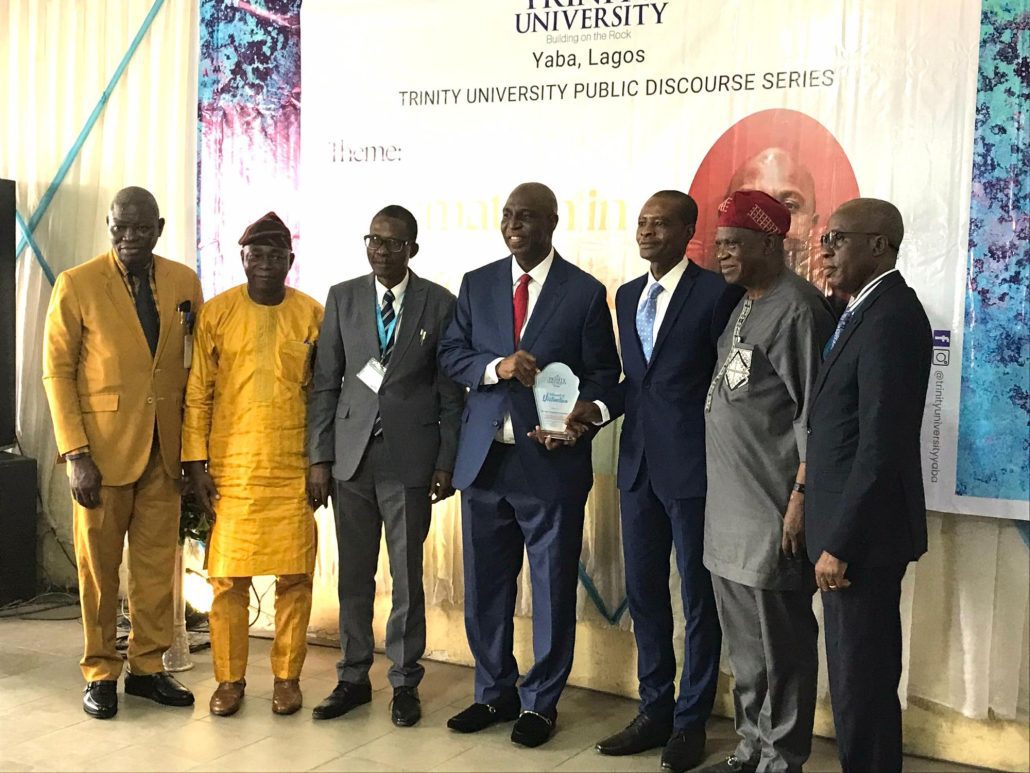

By Elizabeth Chimobi
Chairman of the Editorial Board at The Nation newspaper, Sam Omatseye delved into the transformative power and risks of media in the digital age during a lecture at Trinity University, Yaba, Lagos today.
His address, part of the university’s public discourse series, focused on the theme “Information in an Age of Flux.”
Omatseye highlighted the dual-edged nature of technological advancements, particularly in media and communication, which have redefined societal engagement by fostering connectivity, virality, and instantaneous access to information.
However, these innovations also present challenges, such as the proliferation of misinformation, a decline in accountability, and the erosion of critical thinking.
He stressed the dangerous blur between reality and virtuality, intensified by artificial intelligence (AI).
To mitigate these challenges, Omatseye advocated for stronger legal frameworks and ethical standards. He pointed to the case of Babatunde Raji Fashola, former Lagos State Governor, who successfully sued for defamation, as an example of how public figures can push back against slander and misinformation.
Omatseye also called for the establishment of a media ombudsman to hold platforms accountable for the spread of false information, extending this call to tech giants such as Facebook and X (formerly Twitter).
Recognizing the need for balance, Omatseye urged society to find equilibrium between freedom of expression and regulatory order. He called for commonsense laws and ethical standards that would safeguard the integrity of information while preventing the harms caused by unchecked digital virality.
Vice-Chancellor of Trinity University, Professor Clement Kolawole, explained that the public lecture series aims to bridge the university and the broader community by addressing pressing national and international issues. “This platform allows us to engage with topics of wide-reaching significance while showcasing our university’s contributions to these important discussions,” Kolawole noted.
He also highlighted the need to regulate social media, noting the dangers of unfiltered content and its potential to destabilize societies.
Kolawole referenced the catastrophic effects that misinformation has had in various countries, even sparking conflicts. “Unregulated communication has led to the collapse of systems and sparked wars in some places. We cannot afford to ignore its dangers,” he warned, urging for continuous reflection and adaptation in how information is shared and processed.
Kolawole stressed the importance of discernment in today’s information-saturated world.
He advocated for a more cautious approach to processing information, urging individuals to verify sources and be mindful of how they respond to what they read.
In his reflection on the lecture, Engineer Bayo Kolade, a member of the governing council at Trinity University and Chairman of Trinity International College, echoed the importance of understanding the role of information in today’s society.
Kolade emphasized that while technology has made information easily accessible, it is vital to learn how to process the overwhelming amount of content available. “Information is everything in this age, but it can be both disruptive and beneficial. We must learn how to sift through it carefully,” Kolade said.
He stressed that this responsibility extends beyond individuals, noting that students, in particular, should be taught how to distinguish fact from fiction. “We must train ourselves and the next generation to verify the authenticity of the information we consume,” he added.
The conversation also shifted to Nigeria’s new government student loan program, aimed at addressing financial challenges in education.
Kolade expressed optimism about the initiative but emphasized the need for inclusivity, particularly for students attending private institutions.
He noted that private universities, once perceived as exclusive to the wealthy, are increasingly sought after by middle-class families for their academic rigor and the promise of uninterrupted study.
Kolade advocated for the expansion of the student loan program to include private universities, explaining that many middle-class families struggle to afford private education despite being taxpayers.
He proposed that educational funds should be managed through specialized institutions or commercial banks to ensure equal access to financial support for all students, regardless of the type of institution they attend.
In conclusion, the lecture underscored the profound influence of information technology in shaping both individual lives and broader societal structures, with an urgent call for ethical accountability, regulatory balance, and equitable access to education in the modern world.





Leave a Reply
View Comments